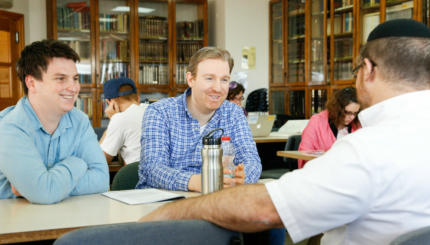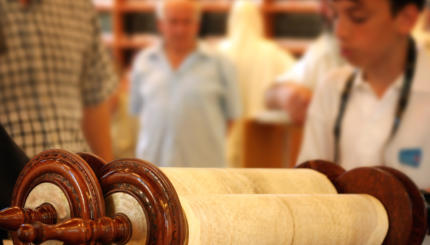The Torah, also known as the Five Books of Moses or the Pentateuch, is divided into 54 separate portions, each named for the first word or words of the passage — and each linked to a specific week. The weekly portion — known as Parashat Hashavuah, or simply “the parsha” — is read aloud, or chanted, from the Torah scroll as part of the Torah service in synagogue on Shabbat (Saturday) morning.
For each Torah portion, My Jewish Learning offers numerous commentaries from a wide range of perspectives. You also may want to check out your local synagogues and other nearby Jewish institutions for courses or lectures on the portion. But if you’re still hungry for more, we’ve listed a variety below in different media (podcasts, videos and written). All are free of charge, although in some cases there is a fee for supplementary materials.
Podcasts (some also feature text versions)
Covenant and Conversation (Rabbi Jonathan Sacks)
Rabbi Jonathan Sacks, the former chief rabbi of the United Kingdom and author of the best-selling “Not in God’s Name: Confronting Religious Violence,” produces a Torah commentary each week, available in podcast and print form (ranging from 1,000-2,000 words). All commentaries come in English and Hebrew, and some are translated into Spanish and Portuguese. Click Covenant and Conversation tab — updated each week, plus archive of past years. Delivered weekly by email.
Mechon Hadar Weekly Divrei Torah
Each year a different faculty member of Hadar, a New York City pluralistic co-ed yeshiva, delivers a weekly podcast on the Torah portion. The podcast (some are available in both English and Hebrew) is often accompanied by related source sheets and other written materials. Archives go back to 2013.Podcast subscriptions through iTunes and others; email subscription for text version.

Help us keep Jewish knowledge accessible to millions of people around the world.
Your donation to My Jewish Learning fuels endless journeys of Jewish discovery. With your help, My Jewish Learning can continue to provide nonstop opportunities for learning, connection and growth.
Pardes from Jerusalem: Weekly Parsha Podcast
Pardes, a co-ed, pluralistic yeshiva in Jerusalem, produces this 10-to-20 minute podcast on the Torah portion, each week led by a different member of its 40-teacher faculty. The archives go back to 2009. Subscription available through iTunes or Google Play.
ParshaCast
In each podcast episode host Eitan Gutin, a Jewish educator at a Conservative congregation in Washington, DC, invites a different guest — usually a rabbi or Jewish communal professional — to chat about the week’s Torah portion. The podcast, also available as a video, launched in October 2016: So far guests span the Jewish streams and episodes are approximately half an hour long. Although ostensibly updated each week, there are occasional omissions. Email and podcast subscriptions available.
ParshaNut
A play on words (parshanut is Hebrew for commentary), ParshaNut is a podcast/essay (you can listen to it or read it) updated weekly by Torah enthusiast Rabbi David Kasher. Kasher, the senior rabbinic educator of Kevah, an organization that helps people form Jewish study groups, describes ParshaNut as “exploring the weird and wonderful riches of the genre.” Commentaries, which often subtly address items from the news cycle, are accessible and about 1,000-2,000 words (approximately 10 minutes in podcast form) long. Archive goes back to 2013. Weekly emails on Thursdays — podcast subscriptions via iTunes.
The Parsha Discussion
These written commentaries (approximately 1,000 words each) and podcasts are designed to “stimulate a discussion around the Shabbat table, especially with teenagers.” They are created by Rabbi Alex Israel, who teaches Bible at Pardes, a co-ed, pluralistic yeshiva in Jerusalem and is a volunteer for Tzohar, a group that seeks to bridge the gaps between religious and secular communities in Israel.
Videos
AlephBeta
Offers three animated videos per Torah portion: two 10-12 minute ones narrated by Rabbi David Fohrman and one, called The Parsha Experiment, that is longer, with somewhat more sophisticated animation and geared toward a younger audience (tweens/teens). You can watch three videos a month for free, but have to become a member ($9/month) to access more.
BimBam (formerly G-dcast)
Most of BimBam’s weekly Torah portion videos are already embedded on My Jewish Learning’s Torah portion pages. However, their site has the full collection as well as accompanying source sheets and study guides (plus videos on numerous other Jewish topics). These short (approximately three minutes long) animated videos are sometimes irreverent. Videos are targeted for ages 13+, but many (and they are marked on the site) are appropriate for children as young as 5. Weekly emails usually go out on Fridays.
Written Commentaries

Matan Dvar Torah
Short (500-1,000 words) written commentaries — each written by a different rabbi — relating the week’s Torah portion to issues of disabilities and special needs in education.
TheTorah.com
Extensive trove of essays and academic commentaries on the weekly portion, written by professors and scholars of Jewish studies. Pieces are relatively lengthy (1,600-2,500 words) and not light reading, but are edited to make accessible to a motivated reader. Sample titles include, “Differing Conceptions of the Divine Creator,” “The Exodus Story as Jewish Mnemohistory,” and “The Existence of Two Versions of the Decalogue.” The website is organized by portion but you need to know which portion to search for — it doesn’t tell you which is the current week’s. Weekly emails featuring newly published material delivered on Thursdays.
Torah from T’ruah
Weekly commentaries that connect the Torah portion to contemporary human rights issues, published by T’ruah: The Rabbinic Call for Human Rights. The current week’s portion appears at the top, but you can search, by portion, for previous commentaries as well.
For Children and Families
Challah Crumbs
Challah Crumbs offers short, kid-friendly commentaries, plus discussion guides activities, like word-search puzzles, coloring activities and crafts, on each week’s Torah portion. Some commentaries are available as podcasts, as well. Podcast subscriptions available through iTunes. Weekly email with 10 questions on the week’s Torah portion delivered each Thursday.
Jewish Journey Project’s Shabbat Table Talk
Activities and discussion topics for each Torah portion, with options for different age and challenge levels.
Parsha Storybook Project
Each Torah portion (so far the project only includes the portions from Genesis and Exodus) lists “age-appropriate storybooks that help children learn the characters, story and themes in the Torah text.” To read the book, you can click on the link to purchase it from Amazon, or find it elsewhere. Books are not reprinted on the site.
Did we miss anything? Email suggestions to community@myjewishlearning.org.




